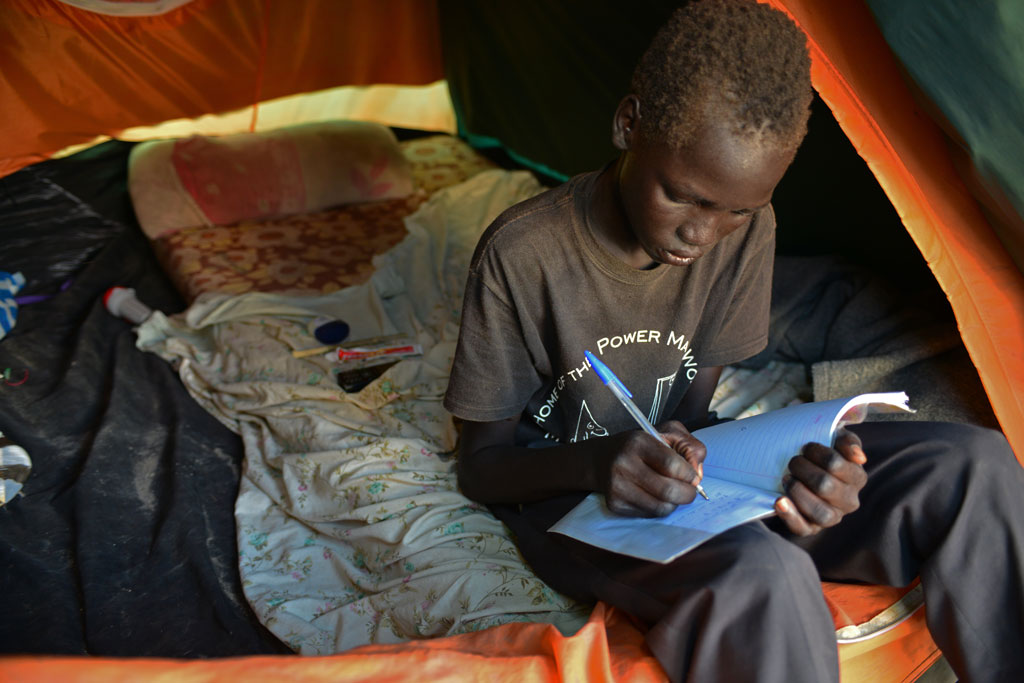From UN News Centre
16 May 2016 – At next week’s World Humanitarian Summit, more than 100 of the world’s leading countries, companies and philanthropists will join forces to create a “major breakthrough” in the effort to assist millions of children who’s education has been disrupted by conflicts and natural disasters, the United Nations envoy for education announced today.
The new Education Cannot Wait fund is being launched next week at the two-day Summit in Istanbul, Turkey.
“It is designed to cater the needs of 30 million displaced girls and boys, the largest population of girls and boys uprooted since 1945 – 20 million of whom have no choice at the moment and are unable to go to school,” UN Special Envoy Gordon Brown told reporters at UN Headquarters in New York, via telephone.
“This fund will be unique in many different ways,” he explained. “We will be the first to bridge the gap between humanitarian aid and development aid. At present education falls through the net. Most humanitarian aid goes – as you would expect – to food and shelter, and development aid is long terms and not geared to an emergency.”
Mr. Brown highlighted that action has to be taken urgently because the sheer scale of numbers of children missing out on schooling is becoming a “full-blown global crisis.” He underscored that the new fund could be the only chance to save a generation lost to war, child marriage, forced labour and the recruiters for violent extremism.
“We believe that this fund will offer young people hope, because when we ask ourselves what breaks the lives of once thriving young children, it’s not just the Mediterranean wave that submerged the life vest, it’s not just the food convoy that does not arrive in Syria, it is also the absence of hope; the soul crushing certainty that there is nothing ahead to plan or prepare for, not even a place in school,” the envoy warned.
The fund – an historic, global first that will seek substantial sums from governments and business – is being hailed as a “game changer.” The funding campaign’s immediate aim is to raise $3.85 billion across the next five years. The goal is to recruit 100 major donors, from philanthropic foundations and the business sector as well as governments and international agencies.
Figures from the UN Office for the Coordination of Humanitarian Affairs (OCHA) show that education aid receives less than two per cent of emergency funding. The new fund is expected to:
- offer up to five years of educational emergency, recognizing that the average time a refugee is out of his or her country is more than 10 years;
- have private sector, foundation and philanthropic windows and will be the first comprehensive education public partnership in humanitarian aid; and
- engage philanthropic companies in innovative solutions to deliver education, including bold experiments in online education to help refugees in camps and those holed up in hovels, huts and tents.
The UN has stressed that the ultimate aim for Education Cannot Wait is to transform humanitarian aid for the future.
“This is a lost generation we must help urgently. We live in a world where refugee needs are not temporary, with many spending more than a decade out of country,” said Mr. Brown. “For too long we have neglected the education of young people in conflict zones, at the cost of making youth the recruits for terrorist groups and their parents the most likely to leave and seek a better future for their children in Europe or America,” he added.
Many businesses have already agreed to take part alongside many of the world’s top aid donors. Individual philanthropists have also been approached.
The new fund will build on the recent Syrian initiative promising one million Syrian refugees schooling in Turkey, Lebanon and Jordan but it will also occur in Nepal where 900,000 children are out of school because of the earthquake emergency, in South Sudan where one third of children are denied schooling and in Nigeria where Boko Haram have closed 5,000 schools.
Meanwhile, the UN also announced today that almost 200 humanitarian partners from across the Pacific are heading to Istanbul for the World Humanitarian Summit, where the region’s experiences in responding to disasters and climate change will be high on the agenda.
A total of 15 Pacific governments have signaled their commitment to send high level delegations to Turkey including Heads of Government from Fiji, Tuvalu, the Cook Islands, Nauru and Vanuatu.
Source: http://goo.gl/hnKu4w


